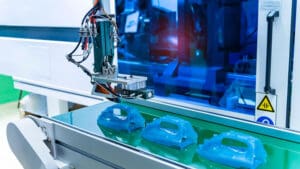The demand for precision plastic solutions in the global manufacturing sector is rising as industries seek efficient, cost-effective methods to produce complex parts.
Providers like Protolabs EMEA offer services such as injection moulding service, which are instrumental in meeting these industry needs.
This topic encompasses the historical context of injection moulding as a pivotal manufacturing process and explores how its evolution supports diverse global manufacturing demands. Understanding the technical advancements and applications of precision plastic solutions is essential for grasping their significance in today’s industrial landscape.
Background and origins
Injection moulding has its origins in the late 19th century, with the first patent being filed in 1872. Initially, the process was rudimentary, focusing on manufacturing simple items such as combs and buttons. Over the decades, technological advancements have vastly improved its precision and scope.
As material science progressed, the introduction of polymers and high-performance plastics opened new avenues for injection moulding, transforming it into a versatile process capable of producing detailed and durable components for various industries.
Developments and growth
Protolabs EMEA, as a leader in the field, underscores the significant developments in injection moulding technology. The company specialises in rapid prototyping and low-volume production, utilising advanced CAD software and precise moulding techniques to ensure high-quality output.
The company’s innovative approach allows for quick turnaround times and customisation capabilities, meeting the diverse needs of sectors such as automotive, medical devices, and consumer electronics. This adaptability highlights the ongoing growth and development within the injection moulding industry.
Current situation
Today, precision plastic solutions are integral to global manufacturing operations. Protolabs EMEA’s extensive capabilities in injection moulding enable it to serve a broad client base across multiple continents. The company’s commitment to technological advancements ensures it remains at the forefront of the industry.
The current focus is on improving sustainability and efficiency in production processes, with continuous investments in automated systems and environmentally friendly materials, reflecting a broader industry trend towards greener manufacturing practices.
Influence and significance
The impact of precision plastic solutions extends beyond manufacturing efficiency. It is crucial in driving innovation, reducing costs, and improving product quality across various industries. Such solutions facilitate the creation of intricate components that would otherwise be challenging to produce using traditional methods.
The societal implications include enhanced product availability and performance, which contribute to economic growth and the advancement of technology. These developments underscore the importance of continued investment and research in precision plastic technologies.
Conclusion
Precision plastic solutions, through providers like Protolabs EMEA, play a pivotal role in modern manufacturing. The evolution and continual enhancement of injection moulding technique signify its essential position in meeting the complex demands of today’s industries.
While the focus remains on innovation and sustainability, the enduring relevance of these solutions suggests they will remain integral to global manufacturing dynamics, offering a pathway to enhanced industrial efficiency and creativity.


















